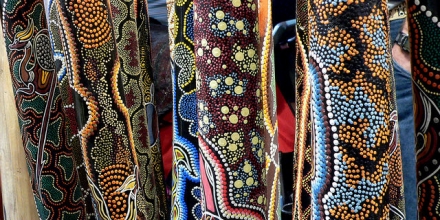The effect of quarantining welfare on school attendance in indigenous communities

Event details
Seminar
Date & time
Venue
Speaker
Contacts
This talk will analyse the impact of a recent initiative by the Australian Government to reduce disadvantage in Aboriginal communities. The policy known as income management quarantines 50 of most income support and family assistance payments, and 100 per cent of all lump sum transfers. Restricting welfare payments aims to ensure that households spend more on child-centred goods (e.g. food, housing, education), and less on goods with negative externalities on community safety and well-being (e.g. alcohol, cigarettes). We identify the causal impact of income management on school attendance rates by exploiting exogenous variation from the staggered rollout of this compulsory policy across communities. We focus on school attendance because it is a precise and high-frequency measure of community functionality. We find no evidence that income management increased attendance. Rather, the introduction of income management reduced attendance by 2.7 percentage points (4 per cent) on average in the first five months after which attendance eventually returned to its initial level. The attendance penalty tended to be stronger for boys and secondary school students. We find no evidence that churning in student enrollments, increasing school transfers, or confounding with other policies caused the drop in school attendance. Conversely, the temporary drop in school attendance is likely due to implementation issues, as the attendance penalty associated with income management is lower after the adoption of more flexible administrative arrangements.
Stefanie Schurer is a tenured Associate Professor in the School of Economics at the University of Sydney. She founded and leads the Economics of Human Development research node at the Charles Perkins Centre. Most of her current projects explore the evolution of skills, preferences, and mental health over the lifecourse and the role that parents, public policy, and the medical care sector play in their trajectory. She is involved in several linked administrative data projects in Australia financed through the National Health and Medical Research Council, evaluating, among others, the impact of early-life medical care and welfare reforms on children’s human development. Recently, she received heightened media and government attention for her controversial findings on the negative impact of income management – the key component of the Northern Territory Emergency Response – on Indigenous children’s well-being. She is also a Chief Investigator in the Prime Minister and Cabinet’s LiNTAG project that aims to strengthen the Australian and Northern Territory Governments’ shared policy focus on reducing Indigenous disadvantage. Her work has been published in the Economic Journal, Journal of Health Economics, Health Economics, Journal of Applied Econometrics, Journal of Economic Behavior & Organization, and Journal of the Royal Statistical Society, among others. She is an Associate Editor of the Journal of Economic Behavior & Organization. She has won several prestigious early career fellowships including a University of Sydney SOAR Fellowship and an ARC Discovery Early Career Fellowship. She is a Visiting Scholar at The University of Chicago and a Research Fellow at the IZA Bonn.
A light lunch will be available from 12-12.15pm, please register your attendance at the registration tab above.
Updated: 15 August 2024/Responsible Officer: Crawford Engagement/Page Contact: CAP Web Team










